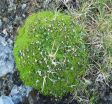(Press-News.org) Genetic medicine experts from Manchester Biomedical Research Centre at Saint Mary's Hospital and The University of Manchester have identified a new gene responsible for causing an inherited form of tumour, known as spinal meningioma.
Professor Richard Marias, Director of the Paterson Institute
Meningiomas are the commonest form of tumour affecting the brain and spine. Usually meningiomas can be removed by surgery and do not recur. Occasionally people can develop more than one meningioma or many members of the same family can be affected.
A team led by Dr Miriam Smith, Professor Gareth Evans and Dr Bill Newman worked with families with a history of meningiomas affecting the spinal cord. Using a powerful new genetic sequencing technique called next generation sequencing, they were able to check all the genes of three individuals with multiple spinal meningiomas. This lead to the identification that changes in a gene called SMARCE1 lead to spinal meningiomas in some families.
In December 2012 the government announced a focus on genetic sequencing with an aim of sequencing the genomes (a person's DNA) of 100,000 Britons with cancer and rare diseases in UK centres. The voluntary sequencing of patients will lead to better testing, better drugs and above all better care for patients. Manchester is already using this technology in their well established Genetics department at Saint Mary's and it is enabling doctors to ensure patients have access to the right drugs and personalised care quicker than ever before.
In the past year 10 genes have been discovered using the new next generation sequencing technology in Manchester including genes for developmental problems, deafness, short stature and bladder problems that lead to kidney failure.
"With our new DNA sequencing machines, we have been able to show that changes in the SMARCE1 gene are responsible for multiple spinal meningioma disease," said Dr Smith. "Before our work, doctors did not know that inherited spinal meningiomas have a completely different cause to other tumours affecting the brain and spine.
"The next step is to develop a screening programme to assess the risk of developing spinal tumours for individuals in affected families, and to investigate possible treatments to prevent the spinal tumours from growing."
Professor Richard Marias, Director of Cancer Research UK's Paterson Institute at The University of Manchester, said "This research highlights the complexity of tumour diagnosis. Such detailed molecular characterisation underpins current thoughts about how meningioma and cancer will be managed in the future and is at the heart of the personalised medicine approach."
Just over two people in every 100,000 develop meningiomas in the head and spine, with twice as many women as men diagnosed with the condition.
###
The team's pioneering work was funded by The Children's Tumor Foundation, a US-based charity supporting neurofibromatosis research, and the Association for International Cancer Research, a global cancer research charity.
Researchers in Manchester find genetic key to preventing spine tumors
Genetic medicine experts from Manchester Biomedical Research Centre at Saint Mary's Hospital and The University of Manchester have identified a new gene responsible for causing an inherited form of tumor, known as spinal meningioma
2013-02-19
ELSE PRESS RELEASES FROM THIS DATE:
Subordinate animals as guinea pigs
2013-02-19
In their environment, wild animals are exposed to countless threats, be they predators, diseases or natural obstacles to get over, such as gorges or rivers. In the course of evolution, they have developed specific behavioural responses to allow them to deal with these risks. In recent times, numerous man-made threats have been added to the naturally-existing ones, such as dangerous roads to cross. On the evolutionary time scale, it is excluded that the animals have evolved a whole new repertoire of adaptive responses to these risks. Simon Townsend is a behavioural biologist ...
Reduced sea ice disturbs balance of greenhouse gases
2013-02-19
The widespread reduction in Arctic sea ice is causing significant changes to the balance of greenhouse gases in the atmosphere. This is shown in a new study conducted by researchers from Lund University in Sweden, among others.
According to the study, the melting of sea ice in the Arctic has a tangible impact on the balance of greenhouse gases in this region, both in terms of uptake and release. The researchers have studied the greenhouse gases carbon dioxide and methane both in the tundra and in the Arctic Ocean.
"Changes in the balance of greenhouse gases can have ...
The criteria for weight-loss surgery need to be changed
2013-02-19
Weight-loss surgery is currently only offered to patients who exceed a certain BMI. However, surgical intervention could improve the health of many more people. This is shown by the Swedish Obese Subjects study carried out at the Sahlgrenska Academy, University of Gothenburg, Sweden, involving 104 patients who were operated on despite their BMI being "too low". As a result, the risk of developing diabetes was reduced by 67 percent.
In order to meet the current selection criteria for weight-loss surgery, Swedish patients must have a body mass index (BMI) above 40 for ...
Cushion plants help other plants survive
2013-02-19
Alpine cushion plants help other plants in harsh mountain environments to survive. This is shown by new research involving researchers from the University of Gothenburg, the results of which are now being publishing in the highly respected journal Ecology Letters.
Cushion plants are a type of plant found in areas such as Arctic environments, and are characterised by their distinctive, round, cushion-like shape.
A new study highlights the strong interaction between cushion plants and other plants in the most severe of mountain environments.
"Cushion plants create additional ...
New projections of 'uneven' global sea-level rise
2013-02-19
Sophisticated computer modelling has shown how sea-level rise over the coming century could affect some regions far more than others. The model shows that parts of the Pacific will see the highest rates of rise while some polar regions will actually experience falls in relative sea levels due to the ways sea, land and ice interact globally.
Reporting in the journal Geophysical Research Letters researchers have looked ahead to the year 2100 to show how ice loss will continue to add to rising sea levels. Scientists have known for some time that sea level rise around the ...
New insight into dogs fear responses to noise
2013-02-19
A study has gained new insight into domestic dogs' fear responses to noises. The behavioural response by dogs to noises can be extreme in nature, distressing for owners and a welfare issue for dogs.
The research by academics from the School of Veterinary Sciences at the University of Bristol, and funded by the RSPCA, is published in Applied Animal Behaviour Science. The study provides an important insight into dogs' fear of noises, and could improve our understanding of behavioural signs of fear or anxiety.
In the study two approaches were taken to investigate the ...
Molecules generated that can halt metastasis of colon cancer
2013-02-19
A Basque research consortium has managed to halt the progress of colon cancer and its metastasis in the liver in an experimental model with mice. This advance, that may open a new path for the future treatment of such pathologies, has been achieved by creating molecules which interfere with the adhesion of tumour cells to other cells of the organism. In this way, the molecules halt both the growth of the tumour and the dissemination of the tumour to and its proliferation in other organs.
The research, published in the prestigious North American Journal of Medicinal Chemistry, ...
CWRU study examines family struggles with anger and forgiveness when relative is dying
2013-02-19
Watching a loved one die tests some family members' relationships with God or the higher being of one's faith. And the spiritual anger and resentment grow with the level of pain and suffering their family member endures, according to researchers at Case Western Reserve University.
Psychologist Julie Exline and palliative care advanced practice nurse Maryjo Prince-Paul surveyed 147 family members with a hospice patient under home care.
More than four of every 10 respondents reported at least some level of anger with God, a major source of which was watching a loved ...
New discoveries linking gut bacteria with cholesterol metabolism give hope for the future
2013-02-19
Researchers at the Sahlgrenska Academy, University of Gothenburg, Sweden, show that cholesterol metabolism is regulated by bacteria in the small intestine. These findings may be important for the development of new drugs for cardiovascular disease.
It is well established that cholesterol is the major risk factor for cardiovascular disease. Cholesterol – which is mainly synthesized in the body but also obtained from dietary sources – is converted to bile acids in the liver, which are then secreted into the intestine and either removed from the body or recycled back to ...
When selecting a child's doctor, families prefer grapevine over online ratings
2013-02-19
ANN ARBOR, Mich. – Numerous websites are available to rate just about any service or product: restaurant food, hotel service and even a pediatrician's care. However, a new poll from the University of Michigan shows that only 25 percent of parents say they consider doctor rating websites very important in their search for a child's physician.
But the latest University of Michigan Mott Children's Hospital National Poll on Children's Health did show that younger parents, those under 30, were more likely to say that online doctor ratings are very important. And mothers were ...
LAST 30 PRESS RELEASES:
Scientists identify smooth regional trends in fruit fly survival strategies
Antipathy toward snakes? Your parents likely talked you into that at an early age
Sylvester Cancer Tip Sheet for Feb. 2026
Online exposure to medical misinformation concentrated among older adults
Telehealth improves access to genetic services for adult survivors of childhood cancers
Outdated mortality benchmarks risk missing early signs of famine and delay recognizing mass starvation
Newly discovered bacterium converts carbon dioxide into chemicals using electricity
Flipping and reversing mini-proteins could improve disease treatment
Scientists reveal major hidden source of atmospheric nitrogen pollution in fragile lake basin
Biochar emerges as a powerful tool for soil carbon neutrality and climate mitigation
Tiny cell messengers show big promise for safer protein and gene delivery
AMS releases statement regarding the decision to rescind EPA’s 2009 Endangerment Finding
Parents’ alcohol and drug use influences their children’s consumption, research shows
Modular assembly of chiral nitrogen-bridged rings achieved by palladium-catalyzed diastereoselective and enantioselective cascade cyclization reactions
Promoting civic engagement
AMS Science Preview: Hurricane slowdown, school snow days
Deforestation in the Amazon raises the surface temperature by 3 °C during the dry season
Model more accurately maps the impact of frost on corn crops
How did humans develop sharp vision? Lab-grown retinas show likely answer
Sour grapes? Taste, experience of sour foods depends on individual consumer
At AAAS, professor Krystal Tsosie argues the future of science must be Indigenous-led
From the lab to the living room: Decoding Parkinson’s patients movements in the real world
Research advances in porous materials, as highlighted in the 2025 Nobel Prize in Chemistry
Sally C. Morton, executive vice president of ASU Knowledge Enterprise, presents a bold and practical framework for moving research from discovery to real-world impact
Biochemical parameters in patients with diabetic nephropathy versus individuals with diabetes alone, non-diabetic nephropathy, and healthy controls
Muscular strength and mortality in women ages 63 to 99
Adolescent and young adult requests for medication abortion through online telemedicine
Researchers want a better whiff of plant-based proteins
Pioneering a new generation of lithium battery cathode materials
A Pitt-Johnstown professor found syntax in the warbling duets of wild parrots
[Press-News.org] Researchers in Manchester find genetic key to preventing spine tumorsGenetic medicine experts from Manchester Biomedical Research Centre at Saint Mary's Hospital and The University of Manchester have identified a new gene responsible for causing an inherited form of tumor, known as spinal meningioma

